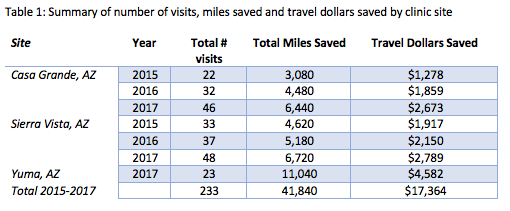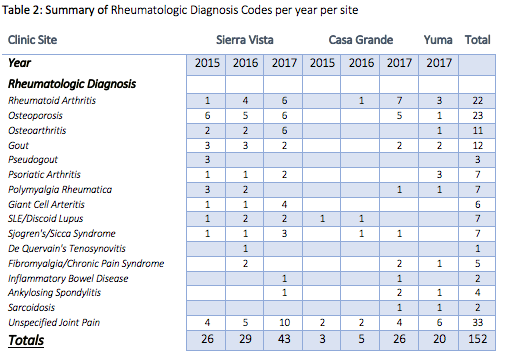Session Information
Session Type: ACR/ARHP Combined Abstract Session
Session Time: 9:00AM-11:00AM
Background/Purpose:
Telerheumatology services were developed at the Southern Arizona VA Health Care System (SAVAHCS) to provide specialty care to remote Community Based Outpatient Clinics (CBOCs). The aims of this study were to examine the potential benefits of this telerheumatology program.
Methods:
As part of a quality improvement initiative, we performed a review of the patients seen in the SAVAHCS’ weekly telerheumatology clinics in Sierra Vista, Casa Grande, and Yuma, AZ from 2015 to 2017. At each of the CBOCs, we use high level audio-video technology to obtain the patient’s history in an in-person visit, direct nurses on appropriate musculoskeletal exams, assist in making diagnoses, and, ultimately, carry out the patient’s treatment plan. The nurses received training on recognizing common rheumatologic disorders and performing a focused musculoskeletal exam. We calculated the following: the miles saved based on an estimate of the distance that patients did not need to travel as a result of the telerheumatology visit; miles saved based on round trip miles from the patient’s CBOC clinic to the SAVAHCS (i.e. 70 miles one way for both Casa Grande and Sierra Vista CBOCs and 240 miles one way for Yuma CBOC); and estimates of direct cost savings were generated using the reimbursement rate for beneficiary travel (0.415/mile).
We also evaluated the number of encounters and unique patients for the most common rheumatologic diagnoses by CBOC site and by year.
Table 1 summarizes the total number of patient encounters, miles saved, and travel dollars saved by CBOC site and year.
Table 2 summarizes the number of unique rheumatologic diagnoses in each CBOC site and year. A patient may have more than one rheumatologic diagnosis associated with each visit.
Of note, the total number of rheumatologic diagnoses in Sierra Vista increased from 26 diagnostic codes in 2015 to 43 diagnostic codes in 2017. In Casa Grande, the number of rheumatologic diagnostic codes increased from 3 in 2015 to 26 in 2017.
Conclusion:
Our telerheumatology program has demonstrated a year-to-year increase in the use of the provided services, based on the increase in patient visits and diagnostic codes. Overall, telerheumatology shows excellent potential in increasing access to underserved populations by decreasing travel-related costs, as well as decreasing the time and distance traveled to appointments.
To cite this abstract in AMA style:
Peck A, Pender A, Kwoh CK. Benefits Accrued through the Implementation of Telerheumatology Services [abstract]. Arthritis Rheumatol. 2018; 70 (suppl 9). https://acrabstracts.org/abstract/benefits-accrued-through-the-implementation-of-telerheumatology-services/. Accessed .« Back to 2018 ACR/ARHP Annual Meeting
ACR Meeting Abstracts - https://acrabstracts.org/abstract/benefits-accrued-through-the-implementation-of-telerheumatology-services/


